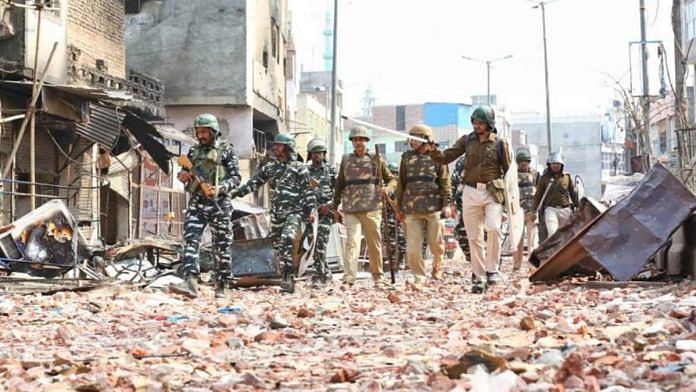New Delhi: When history will look back at the worst communal riots since the partition in Delhi, the failure of the investigating agency to conduct a proper probe, using latest scientific techniques, will surely torment the sentinels of democracy, a Delhi court said Thursday, while discharging three persons in two cases related to the 2020 northeast Delhi riots.
In a critical commentary on the nature of Delhi Police’s probe in the two cases, additional sessions Judge Vinod Yadav said the “sort of investigation conducted” and the “lack of supervision” by the superior officers “clearly depicts” that Delhi Police have merely “tried to pull the wool over the court’s eyes and nothing else”.
The two orders come days after the same judge had in a separate case (on the riots) remarked strongly against the investigating officers for not co-operating with the special public prosecutors appointed to argue the northeast riots cases in trial courts. It was observed by the judge that the police officers were not briefing the prosecutors adequately for arguing the matters.
The court set free Shah Alam (26), Rashid Saifi (23), and Shadab (26), holding that the evidence brought on record by the Delhi Police in the two cases “miserably falls” short for framing charges against them. All three are on bail and the court has ordered the cancellation of their bail bonds and release of their sureties subsequent to their discharge.
Alam is the brother of former Aam Aadmi Party (AAP) councillor Tahir Hussain, who has been accused of participating in the larger conspiracy that led to the riots in northeast Delhi in February 2020. Separately, Hussain is also charged with the murder of Intelligence Bureau (IB) officer Ankit Sharma. Hussain continues to be in jail.
The evidence gathered in both cases gives rise to the suspicion but not grave suspicion against the accused, the court said. And, in case of a doubt, the court is well “within its right to discharge the accused,” according to the law. This means the court did not find sufficient evidence to commit the case for a trial where the men would have had to prove their innocence through cross-examination of police witnesses.
In both the cases registered on 25 February 2020 in Dayalpur, the three were booked under several sections of the Indian Penal Code (IPC), such as rioting, mischief, causing loss or damage to property, among others.
Also read: Loopholes in probe, FIRs wrongly clubbed — why court fined Delhi Police in Feb 2020 riots case
Court points out lack of witnesses, sufficient evidence
Coming down heavily on the “callous investigation” undertaken by the Delhi Police, the judge noted that there were no independent eyewitnesses in both cases.
The charge sheet in the respective cases relied on the statement of the beat constables of the area where the alleged incidents took place. However, the court noted that the statement of these police officers was recorded much after the incident was reported — seven days in one case and eight days in the other.
The court questioned the silence and delay on the part of the policemen. Considering they are the beat constables and had witnessed the incident, they should have reported to the local police station immediately, the court argued.
There was no recovery from the accused, no CCTV footage/video-clip of the incident(s) to confirm the presence of the accused at the spot, the court noted.
Even the call detail records (CDR) location of the accused were not available with the court. The attempt by the police to rely on CDR of the three in a third case was not accepted by the court.
Besides the three, the court said, the police till date have not been able to identify and apprehend any other accused from the riotous mob of 150-200 in the two cases. This, it added, speaks volumes about the efforts put in by the police in this regard.
“This does not appeal to the senses that nobody watched such a large crowd of rioters when they were on a spree of vandalism, looting, and arson,” the court said.
Also read: Riots changed Hindu-Muslim dynamics in NE Delhi. For some, it’s ‘hateful beyond repair’ now
‘Won’t let cases meander mindlessly’
The judge recorded that about 750 cases were registered in connection with the riots, most of which are triable by his court. Around 150 cases have been received by the court for trial. However, it has framed charges in just about 35, while many have been remanded back to the magistrate after it was found the offences made out from the evidence produced did not make the cases triable by a sessions court. This means they were not of heinous nature.
But there are several riot cases in which the police seem to be “still busy in filing supplementary charge sheets” due to which a large number of accused languish in jail.
Such an approach, the court added, is wasting the court’s precious judicial time, as a lot of its time is “consumed by cases like the present one, where there is hardly any investigation carried out by the police”.
According to the judge, the complaints were required to be investigated with a fair amount of “sensitivity and skillfully”. The only task of the police, it said, was to record the statement of the two constables who were eyewitnesses in their respective cases.
The cases are a criminal wastage of time, the court said, as it refused to permit the two cases to “meander mindlessly in the corridors of justice”.
The judge, however, regretted that the casualty in both cases is the “pain and agony” suffered by the complainants.
(Edited by Poulomi Banerjee)
Also read: A year on, Delhi riot victims struggle to cope with depression, nightmares & livelihood loss



